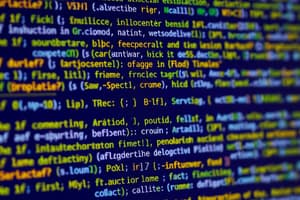Podcast
Questions and Answers
Which of the following statements evaluates a condition in C?
Which of the following statements evaluates a condition in C?
- do-while loop
- for loop
- if statement (correct)
- while loop
The expression if(0) results in a TRUE condition.
The expression if(0) results in a TRUE condition.
False (B)
What does the if-else statement do when the condition is FALSE?
What does the if-else statement do when the condition is FALSE?
It executes the block of code in the else statement.
In an if-else ladder, if all conditions are FALSE, the final block of code executed is in the ______.
In an if-else ladder, if all conditions are FALSE, the final block of code executed is in the ______.
What is the primary purpose of the if statement in C?
What is the primary purpose of the if statement in C?
What is a nested if statement?
What is a nested if statement?
What output would result from the following code if number is 0? if (number < 0) { printf(“You entered negative number: %d”, number); } else { printf(“You entered zero”); }
What output would result from the following code if number is 0? if (number < 0) { printf(“You entered negative number: %d”, number); } else { printf(“You entered zero”); }
Flashcards are hidden until you start studying
Study Notes
Decision Control Statements in C
- Decision control statements are used to execute code based on a condition.
- The three main decision control statements in C are
if,if-else, andswitch-case.
if Statement
- The
ifstatement evaluates a condition and executes a block of code if the condition isTRUE. - Conditions are evaluated as either
TRUEorFALSE. - If the expression results in zero, or the direct value is zero, the condition is
FALSE. - Examples:
if(10)isTRUE.if(0)isFALSE.if(x + y)isTRUEif(x+y)is not equal to zero.if(num1 > 5)isTRUEif the value ofnumis greater than 5.
Simple if Statement
- The
ifstatement evaluates the condition. - If the condition is
TRUE, it executes the block of code that follows. - If the condition is
FALSE, it skips the code. - Syntax:
if (condition) { // Statements to be executed if condition is true } - Example:
if (number < 0) { // Checks if number is negative printf("You entered negative number: %d", number); }
if - else Statement
- The
if-elsestatement evaluates a condition. - If the condition is
TRUE, it executes the first block of code. - If the condition is
FALSE, it executes the second block of code. - Syntax:
if (condition) { // Statements to be executed if condition is true } else { // Statements to be executed if condition is false } - Example:
if (number < 0) { // Checks if number is negative printf("You entered negative number: %d", number); } else { printf("You entered zero or positive number: %d", number); }
Nested if Statement
- A nested
ifstatement is anif-elsestatement within anotherif-elsestatement. - Syntax:
if (condition1) { if (condition2) { // Statements to be executed if condition1 and condition2 are TRUE } else { // Statements to be executed if condition1 is TRUE and condition2 is FALSE } } else { // Statements to be executed if condition1 is FALSE } - Example:
if (number < 0) { // Checks if number is negative printf("You entered negative number: %d", number); } else { if (number == 0) { // Checks if number is equal to zero printf("You entered zero"); } else { printf("You entered positive number: %d", number); } }
if – else – if Statement (if-else Ladder)
- The
if-else-ifladder allows for multiple conditions to be checked. - Each condition is evaluated sequentially.
- The first condition that is
TRUEresults in its corresponding code being executed. - If none of the conditions are
TRUE, the code in the final 'else' block is executed. - Syntax:
if (condition1) { // Statements to be executed if condition1 is TRUE } else if (condition2) { // Statements to be executed if condition1 is FALSE and condition2 is TRUE } else if (condition3) { // Statements to be executed if condition1 and condition2 are FALSE, and condition3 is TRUE } ... else { // Statements to be executed if all conditions are FALSE } - Example:
if(number < 0) { // Checks if number is negative printf("You entered negative number: %d", number); } else if (number > 0) { // Checks if number is positive printf("You entered positive number: %d", number); } else { printf("You entered zero"); }
Studying That Suits You
Use AI to generate personalized quizzes and flashcards to suit your learning preferences.





